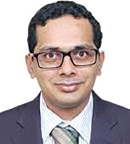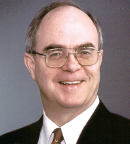In a small phase Ib/II study, 100% of patients with newly diagnosed diffuse large B-cell lymphoma evaluated thus far responded to treatment with obinutuzumab (Gazyva), lenalidomide (Revlimid), and CHOP (cyclophosphamide, doxorubicin, vincristine, prednisone), investigators from the University of Texas MD Anderson Cancer Center reported at the 2016 Pan Pacific Lymphoma Conference in Koloa, Hawaii.1
R-CHOP (rituximab [Rituxan] plus CHOP) has been the standard of care for diffuse large B-cell lymphoma for the past 15 years. For the two main subtypes—germinal center B-cell (GBC) and nongerminal center B-cell (including activated B-cell [ABC])—the reported 3-year event-free survival is 67% and 52%, respectively.

The combination of lenalidomide, obinutuzumab, and CHOP appears to be well tolerated, without any significant toxicity encountered in the phase Ib portion of the trial. The preliminary efficacy is encouraging.— Vishwanath Sathyanarayanan, MD
Tweet this quote
“But approximately 40% of patients eventually relapse. Despite aggressive therapy, patients with relapsed diffuse large B-cell lymphoma have a poor prognosis,” said presenting author Vishwanath Sathyanarayanan, MD, a lymphoma/myeloma fellow at MD Anderson. The senior author and principal investigator was Jason R. Westin, MD, Assistant Professor, Lymphoma/Myeloma at MD Anderson.
“The nongerminal center B-cell subtype has been established as having worse outcome with standard chemotherapy but better responses to certain targeted therapies,” added Dr. Sathyanarayanan. “Lenalidomide is an oral immunomodulatory drug that causes downregulation of interferon regulatory factor 4 (IRF4). This is a hallmark of activated B cells, which, in turn, induces increased interferon signaling,” he added.
Findings From Previous Trials
Previous phase II trials have shown that the regimen of lenalidomide plus R-CHOP in patients with newly diagnosed diffuse large B-cell lymphoma led to higher response rates than R-CHOP alone; this regimen also produced similar progression-free survival and overall survival rates for the GBC and nongerminal center B-cell subtypes. These results suggested that lenalidomide may overcome the adverse outcomes associated with nongerminal center B-cell diffuse large B-cell lymphoma, Dr. Sathyanarayanan pointed out.
Lenalidomide is believed to exert synergistic action with obinutuzumab, a second-generation glycoengineered, humanized, type II anti-CD20 monoclonal antibody that has high antibody-dependent cellular cytotoxicity, high affinity-binding to the CD20 antigen, antibody-dependent cellular phagocytosis via recruitment of natural killer cells, and high direct cell death induction. These characteristics may render this agent well suited for attacking the challenging nongerminal center B-cell subtype, where there is a high unmet need, he suggested.

Jason R. Westin, MD
The previous phase I/II Gather trial2 documented a response rate of 83% and a complete response rate of 55% with obinutuzumab plus CHOP. A randomized trial comparing rituximab/CHOP with obinutuzumab/CHOP in the first-line advanced setting has recently completed accrual, “and the results are highly anticipated,” he noted.
New Study Design
“In this single-center, single-arm phase Ib/II clinical trial, we hypothesized that the combination of lenalidomide plus obinutuzumab with CHOP would be tolerable and result in an overall response rate at least equivalent to lenalidomide plus R-CHOP in newly diagnosed diffuse large B-cell lymphoma,” Dr. Sathyanarayanan said.
Early Trial Results With Obinutuzumab in DLBCL
- A phase Ib/II study showed that 100% of patients with newly diagnosed diffuse large B-cell lymphoma (DLBCL) responded to a regimen of obinutuzumab, lenalidomide, and CHOP at interim PET-CT evaluation.
- Among the first 23 patients treated, interim PET-CT of 12 patients showed a response rate of 100%; all 6 patients with final PET-CT imaging had complete responses.
Along with determining safety, maximum tolerated dose, and efficacy, the investigators are conducting comprehensive genomic profiling of tumor and blood samples and evaluating immune cell subsets at baseline and at the end of the study. They will also use novel technology to evaluate circulating tumor DNA. These findings will be correlated with response.
To date, 23 patients (median age, 58 years) have been enrolled in the phase Ib/II trial. In the phase Ib portion, no dose-limiting toxicities were observed among 6 patients, so the study moved to phase II, with patients receiving obinutuzumab at 1,000 mg intravenously on days 1, 8, and 15 in cycle 1 and on day 1 only in subsequent cycles. CHOP was given by standard dosing, and lenalidomide was dosed at 15 mg orally on days 1 to 14, with dose reductions to 10 mg or 5 mg allowed. Patients were treated for 6 cycles, given every 21 days. Planned enrollment for phase II is 50 patients.
100% Response Rate
To date, 23 patients have been enrolled in both phases of the study. Of them, 12 patients have had interim positron-emission tomography (PET)-CT evaluations after 3 cycles, and their overall response rate was 100%. In 6 patients who completed all 6 cycles of treatment, the complete response rate was 100%, Dr. Sathyanarayanan reported.
“The combination of lenalidomide, obinutuzumab, and CHOP appears to be well tolerated, without any significant toxicity encountered in the phase Ib portion of the trial,” he revealed. “The preliminary efficacy is encouraging, including responses in high-risk diffuse large B-cell lymphoma, irrespective of the cell of origin; however, additional patients will need to be accrued, and follow-up will be required.” The trial was initiated in November 2015 and is expected to complete accrual by the end of 2016, he said.
Additional Comment

James O. Armitage, MD
James O. Armitage, MD, the Joe Shapiro Professor of Medicine at the University of Nebraska Medical Center, Omaha, commented that the data on the use of obinutuzumab in diffuse large B-cell lymphoma are limited to date. Regardless of the encouraging results of this small study, he continued, “it will be a challenge to replace rituximab,” especially if a biosimilar for rituximab becomes available and the cost of rituximab falls. “In that case, obinutuzumab will have to be a lot better,” he suggested. ■
Disclosure: Drs. Sathyanarayanan, Westin, and Armitage reported no potential conflicts of interest.
References

